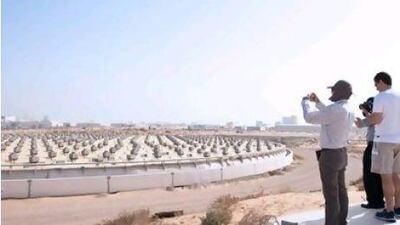RAS AL KHAIMAH // The wealth of Abu Dhabi and the glitz of Dubai do not easily rub off on their northern neighbour Ras al Khaimah. Its leader explains it thus: no oil, scarce water and precious little gas.
Video: Response in RAK to Dh5.7bn investment
Last Updated: June 19, 2011 UAE
Residents and companies respond to the news that the Federal Government is set to invest Dh5.7bn in RAK, in a bid to bring electricity to the Emirate.
"Here there is nothing," says Sheikh Saud bin Saqr, the Ruler of Ras al Khaimah. That is why his family has relied for generations on international trade and alliances to prosper. Thus it was that a group of electronics engineers from 22 nations assembled last week in a dusty work yard under a baking sun to view the emirate's progress towards harvesting one resource it has in abundance: sunlight.
The outdoor laboratory near the coast is the work of CSEM-UAE, a venture between the private Swiss research foundation Centre Suisse d'Electronic et de Microtechnique and the Ras al Khaimah Investment Authority, whose chief executive, Dr Khater Massaad, is Swiss.
Here, due to budget constraints, there is a concerted push to develop "pragmatic solutions that can be implemented within five years", says Dr Hamid Kayal, the chief executive of CSEM-UAE.
The objective is precision engineering on a shoestring: "What CSEM does in Switzerland at the nano and micro scale, we do on a scale 10 to the power of nine times greater."
The joint venture's first project, begun in 2008, was to design, build and test a self-navigating, floating solar platform that could generate electricity at sea or in a lake. If tethered to a drilling rig, it could power offshore oil and gas exploration, while continuously adjusting for the action of waves and currents to stay optimally oriented to the sun.
At the moment, the 5,000-square-metre platform, topped with rows of photovoltaic panels that convert sunlight into electricity, floats in a large tub of sea-water devoid of wave action.
Before putting to sea, the array is being tested in other ways, such as ensuring all its parts are protected from the corrosive effects of the sea.
CSEM-UAE is not trying to copy Masdar, the better-known clean-energy enterprise down the road in Abu Dhabi, but to interact with the better-funded company in the same spirit of friendly rivalry that Switzerland fosters with its larger neighbour Germany, says Dr Kayal. "We're accustomed to doing a lot with a small amount of money," he says.
Other projects are assessing the use of solar heat-collection in district cooling, and seeking the most cost-efficient way to use reflected sunlight to generate power. The solutions are far from obvious.
On the air-conditioning front, the student engineers have not yet come up with a super-cheap way to cool a factory or block of flats using only the sun's energy. But they have designed an inexpensive solar heating array to drive a refrigeration compressor that is also hooked up to a conventional electricity supply. They have managed to reduce the unit's power consumption by 40 per cent.
The pragmatic nature of the projects undertaken here appeals to Swiss investors.
"Beyond watches, few people know that Switzerland is among the most technically advanced countries in the world. There is a desire to investigate here what Swiss technology can bring," says Franco Vigliotti, the dean of Ecole Polytechnique Federale de Lausanne Middle East, which has its campus in Ras al Khaimah.
Close by is the privately owned Falcon Technologies International, another Swiss-UAE venture that makes high-quality compact discs for corporate clients.
Its biggest shareholder is Sheikh Saud. The high-end disc factory aims to compete with rival European plants on the basis of cheap labour and land, as well as subsidised electricity. But maintaining a clean-room environment for precision manufacturing in the desert takes plenty of power and water, making efficient energy and water use imperative for the venture to turn a profit. It has therefore become Ras al Khaimah's ad hoc test facility for efficiency innovations.
Dr Mattia Balestra, the head of Falcon's manufacturing department, says the plant's 350-strong multinational workforce was approached for ideas on saving energy and water. Many of the suggestions were "surprisingly" inexpensive and simple to implement. About 250 have been adopted.
Dr Balestra's own winning idea for reducing water use in the plant's toilets: put a cement block in each cistern so that it holds less.
Thanks to its sandy location, Ras al Khaimah is not short of cement.

